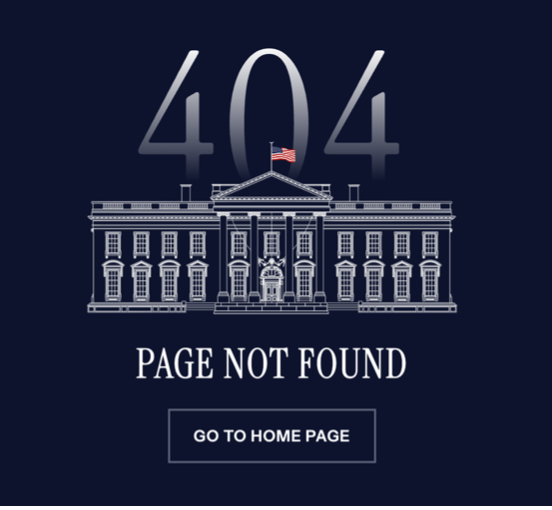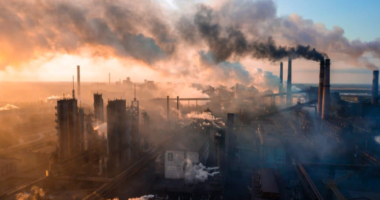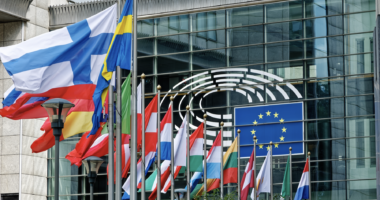Climate, Health and Equity Brief
Shock and awe
February 14, 2025

The Climate, Health & Equity Brief is GMMB’s take on the latest news on the current impacts of climate change. If you haven’t subscribed yet, you can do so by clicking here.
Hot Topic: Chaos. At the dawn of his second term, President Trump has unleashed 34 executive and secretarial orders, memos, and directives to dismantle federal climate initiatives. The sweeping changes have erased climate change information from federal websites, dismissed key staff, shuttered climate offices, and gutted environmental justice initiatives across multiple agencies. And it’s only week three.
On day one, Trump froze billions in federal climate funding, a move now mired in legal challenges. Multiple federal judges have issued temporary restraining orders against the freeze, but Trump remains defiant. Some agencies continue withholding funds, while others have imposed new bureaucratic hurdles that effectively stall or block disbursements. The result: billions for clean energy, rural infrastructure, and disaster relief hang in limbo—ironically, with Republican-led districts standing to lose the most.
Meanwhile, the global climate crisis marches on. Two new studies suggest the world will soon breach the Paris Agreement’s 1.5°C threshold, if it hasn’t already, after 12 months with temperatures above this mark. Another expert has warned that a menacing 2°C rise is now likely within just 20 years. Despite the urgency, 95% of nations missed the UN’s February 10 deadline to submit their 2035 climate plans at a time when the need for climate ambition has never been more urgent.
Yet, amidst the setbacks, there are pockets of good news. Global investment in the low-carbon energy transition soared to a record $2.1 trillion in 2024, led mainly by China, signaling strong international momentum. The World Bank, African Development Bank, and others have pledged at least $35 billion to expand electricity access—much of it through solar mini-grids—to half of those in Africa living without power. And after Trump halted U.S. contributions to the UN Climate Change Secretariat, Michael Bloomberg’s foundation and other donors stepped in to fill the gap.
While the U.S. is undoubtedly in for more climate denial and obstruction under this administration, the fight is far from over. For now, the world will look to global leaders, committed countries and funders, state and municipal governments and frontline organizations to sustain progress where the U.S. government falters.
Human Health
The Trump administration has dismantled the Department of Health and Human Services’ Office of Climate Change and Health Equity, sidelining staff and scrubbing online resources in a broader effort to erase federal climate initiatives. (POLITICO)
A new study published in Nature Medicine finds that without urgent climate adaptation, extreme heat could cause an extra 2.3 million deaths in European cities by the end of the century, with Mediterranean regions at greatest risk. (Nature)
A new study reveals that rising global temperatures are increasing urban rat infestations, raising concerns about public health safety as rats can transmit over 50 pathogens to humans. (ABC News)
Planetary Health
Two new studies published in Nature Climate Change suggest that Earth will soon officially surpass the Paris Agreement’s 1.5°C warming threshold if it hasn’t already following 12 months of temperatures above this mark. (CNN)
Despite mounting pressure, utilities are delaying or canceling coal retirements amid rising energy demand and shifting regulations, with experts warning that political maneuvering, not market logic, is driving last-ditch efforts to extend the coal industry’s survival. (The New York Times)
Equity
The Trump administration is swiftly dismantling federal environmental justice initiatives, shuttering key EPA and Justice Department offices, sidelining staff, and erasing pollution data tools, signaling a dramatic rollback of protections for vulnerable communities. (The New York Times)
The climate crisis has exacerbated housing issues, especially among Black communities who are more likely to live in flood-prone areas, on “heat islands” with little shade, and in places with the highest predicted increase in temperature-related deaths. (Time)
A new UN report finds that climate change, intensified by El Niño, drove up crop prices and worsened hunger across Latin America in 2023, with rural communities facing the greatest risk. (CNN)
Politics & Economy
The Trump administration is quickly implementing a sweeping effort to erase climate change references from federal websites, stripping vital scientific resources from public access and fueling fears of a broader campaign to suppress information amid escalating climate disasters. (The Guardian)
A federal freeze on climate spending has stalled billions in grants, halted clean energy projects, delayed rural infrastructure, and left storm-ravaged communities without aid to rebuild while putting manufacturing projects and jobs at risk, particularly in Republican districts. (The New York Times)
President Trump’s sweeping tariffs on Canada, Mexico, and China threaten to disrupt clean energy supply chains and drive up costs for the solar, wind, battery, and EV industries while injecting economic uncertainty into global trade and investment. (Scientific American, E&E News)
Elon Musk and the Trump administration aim to cut NOAA’s 12,000-employee workforce in half and privatize the National Weather Service, moves that experts say will put lives at risk by wreaking havoc on the scientific and regulatory systems that protect American safety. (POLITICO)
A new study by First Street projects that climate change could erase $1.47 trillion in U.S. home values over the next 30 years, with the Sun Belt region facing potential declines of up to 40% due to rising insurance costs and extreme weather events. (Newsweek)
President Trump has ordered a halt to the $5 billion federal program to install EV charging stations on U.S. highways, a move some states plan to ignore, though the halt freezes any new funding and deals another blow to the already struggling EV market. (The Washington Post)
Nearly 95% of countries—including top polluters like China, India, and the EU—missed the February 10 UN deadline to submit 2035 climate pledges, at a time when experts say global pledges must deliver a “quantum leap in ambition” to keep warming in check. (Carbon Brief)
A new BloombergNEF report finds that despite political uncertainty and high interest rates, global investment in low-carbon energy surged to a record $2.1 trillion in 2024, with most of the growth driven by China. (BloombergNEF)
China’s new AI model, DeepSeek, is challenging U.S. tech assumptions of data center costs, energy usage, and environmental impacts, operating at a fraction of the resource demand and with greater efficiency, raising questions about AI’s climate impact. (AP News, POLITICO)
President Trump has given the EPA until February 19 to assess the “legality and continued applicability” of the Endangerment Finding—the most significant federal ruling in climate policy history that mandates the government limit emissions—though experts say overturning it will be an uphill battle for the administration. (The New York Times)
Global funding for climate technologies fell 40% in 2024, dropping for the third straight year and signaling a continued focus on AI technology rather than decarbonization. (Bloomberg)
The state of Iowa has eliminated terms like “evolution” and “climate change” from Iowa public schools in a move to replace politically charged language with terms like “biological change over time” and “climate trends” to describe the same scientific concepts. (Des Moines Register)
Action
African leaders, global lenders and others have pledged $35 billion in below-market interest rate loans across Africa to electrify half of the continent’s unelectrified population in six years, with half of the money supporting solar “mini-grids” in individual communities. (The New York Times)
After President Trump halted U.S. funding to the UNFCCC, the UN’s climate body, billionaire Michael Bloomberg pledged that his philanthropy and other climate funders would cover the shortfall to help sustain it, which depends on the U.S. for 22% of its core budget. (Climate Home News)
Following a challenge by environmental groups, an Edinburgh, Scotland court decision declared recent authorizations of new oil and gas fields were unlawful, meaning companies Shell and Equinor cannot start drilling without new approval from the United Kingdom. (Sustainability Magazine)
San Francisco State University will be the first major public institution in the U.S. to require climate justice coursework for all students, regardless of major—preparing them for an “all hands on deck” climate crisis that will need solutions from across disciplines and sectors. (KQED)
Life as We Know It
New research warns that 90% of North American stadiums hosting the 2026 FIFA World Cup may experience dangerous heat during the event, and experts urge organizers to invest in climate-resilient infrastructure to ensure safety at large-scale sports events in the future. (Forbes)
A new study finds that 61% of Gen Zers have experienced flooding, drought, or unsafe tap water in their communities in the last two years and that two-thirds expect climate issues to worsen in their lifetimes. (Gallup)
As climate change reshapes global agriculture, farmers are abandoning traditional crops and embracing new ones—like mangoes in Sicily and quinoa in Latin America—as increased heat, extreme weather, and emerging diseases redefine where food can be grown. (Grist)
Kicker
Having a hard time keeping up with the shock and awe tactics of this administration? Track climate-related executive orders, memorandums, and more with Columbia University’s Climate Backtracker.
Continuing on the current path is a form of madness.”
– Bulletin of Atomic Scientists
The GMMB Climate, Health & Equity Brief would not be possible without the contributions of the larger GMMB team—Catherine Ahmad, Aaron Benavides, Stefana Hendronetto, Nikki Melamed, Sharde Olabanji, Kenzie Perrow and Marci Welford. Feedback on the Brief is welcome and encouraged and should be sent to [email protected].





